|
World No Tobacco Day on May 31:
Non-smoking will help create a healthier nation
By Mohammed Naalir
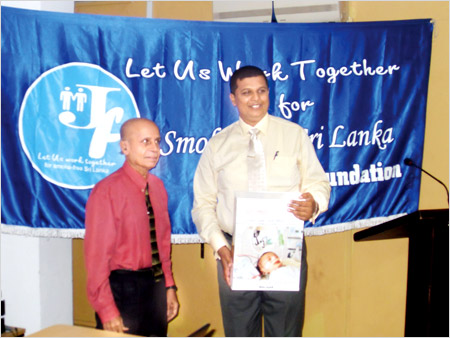
Chairman, NATA, Professor Carlo Fonseka and President, Cancer
Care Association and Director Jeewaka Foundation, Dr. Samadhi
Rajapaksa holding a replica of Pictorial Health Warnings on a
cigarette packet.
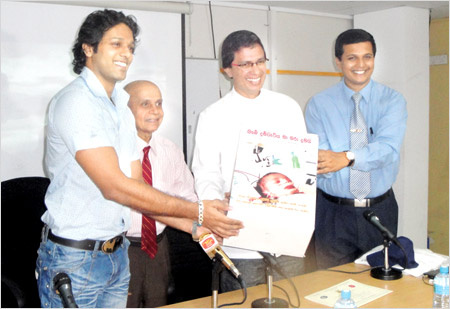
Deputy Minister of Health Lalith Dissanayake, NATA Chairman,
Prof. Carlo Fonseka, President of Cancer Care Association and
Director of Jeewaka Foundation, Dr. Samadhi Rajapaksa and film
actor Roshan Ranawana holding a replica of the pictorial health
warning on a cigarette packet. |
The World No Tobacco Day is commemorated on May 31, 2013 under the
theme, "Ban tobacco advertising, promotion and sponsorship" by the World
Health Organisation.
Tobacco claims a large number of lives every year in the world
including Sri Lanka. Around 39 percent of males smoke cigarettes while
nearly two percent of females are addicted to this habit. Smoking
affects the entire body causing a large number of diseases (NCDs) -
almost all the NCDs, according to the National Authority on Tobacco and
Alcohol (NATA) sources.
The Health Ministry has also organised an awareness program tomorrow
(27) at BMICH under the patronage of Minister Maithripala Sirisena in
line with the World No Tobacco Day. Minister Sirisena will also be
acknowledged and appreciated for his yeoman service extended to control
the use of tobacco and tobacco related products, according to a
spokesman attached to the Health Ministry.
In Sri Lanka around 60 deaths are reported per day due to tobacco
related diseases, which is over 10,200 per year.
Six million people in the world untimely die each year. If the
current trend continues, one billion people will die from tobacco use by
2030. Tobacco is deadly and highly addictive, though this epidemic is
entirely preventable, the sources said.
Tobacco use is responsible for causing diseases in the entire system
in the body. On average, smokers die 13 to 14 years before non-smokers.
Non-smokers are also affected through inhaling the fumes of
irresponsible smokers. Through passive smoking they may become more
susceptible to respiratory problems like asthma and various infections
of the throat and nose. There is also a higher risk of sudden infant
death syndrome, the sources pointed out.
|
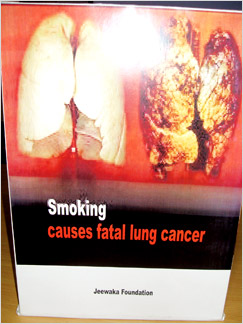
Some of the proposed pictorial health warnings for Sri Lanka. |
Tobacco smoke contains more than 4,000 harmful chemicals like
nicotine, tar, formaldehyde, benzene, carbon monoxide, and hydrogen
cyanide most of which are responsible for causing cancers. And given its
high content of nicotine, tobacco users become addicted to the product.
Some people have the habit of chewing tobacco frequently, while most
people practise cigarette smoking. Both the forms of tobacco use cause
many dangerous health problems.
The teenage group is the most vulnerable group to get conditioned to
tobacco industry promotions and initiate smoking. The teenagers get
conditioned to tobacco use through peer pressure as well.
It is never too late to quit smoking and a strong willpower will help
you do so. Always remember, there should be no compromise, when health
is concerned. Everybody should get detached from this lethal, but legal
product.
Besides the sources said that the best campaign which the World
Health Organisation did was the establishment of the Framework
Convention on Tobacco Control (FCTC) - the first public health treaty in
the world, in 2005. Sri Lanka is a Party to this important treaty. WHO
has identified six actions to reduce tobacco consumption in the world
such as Monitor tobacco use and assess the impact of tobacco prevention
policies, protect people from secondhand smoke, offer help to every
tobacco user to quit, warn and effectively educate every person about
the dangers of tobacco use through strong graphical pictorial health
warnings and sustained mass media public education campaigns, enact and
enforce comprehensive bans on; Tobacco advertising, promotion and
sponsorship and raise the price of all tobacco products by increasing
tobacco taxes.
Article 13 of the FCTC
|
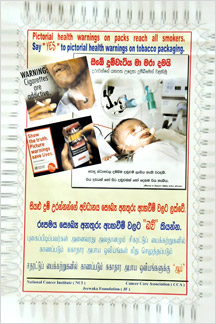
Model cigarette packet containing PHW. |
A comprehensive ban of tobacco advertising, promotion and sponsorship
on tobacco products is required under the WHO Framework Convention for
Tobacco Control - FCTC for all Parties to this treaty within five years
of the entry into force of the Convention for that Party.
|
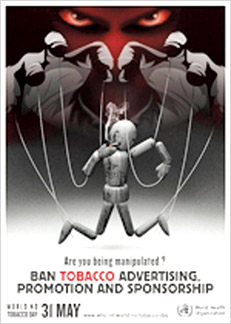
People have the right to live free from
tobacco smoke. |
Evidence shows that comprehensive advertising bans lead to reductions
in the numbers of people starting and continuing smoking. Statistics
show that banning tobacco advertising and sponsorship is one of the most
cost-effective ways to reduce tobacco demand and thus a tobacco control
"best buy". Comprehensive advertising bans on tobacco products can be
achieved by following the international best practice standards outlined
in the Guidelines for implementation of Article 13 of the WHO Framework
Convention on Tobacco Control (WHO FCTC).
To be effective, bans must be comprehensive and apply to all types of
advertising, promotion and sponsorship - both direct and indirect.
Comprehensive bans on advertising, promotion and sponsorship must be
periodically updated to take account of innovations in industry tactics
and media technology. Measures should also be put in place to severely
restrict tobacco imagery in entertainment media such as films and
television.
Tobacco industry invests in sophisticated branding to promote their
products. In many low and middle-income countries, more than a third of
young people own an object with a cigarette brand logo. Prohibiting the
use of tobacco branding on clothing and other items can counter this
powerful technique, NATA sources said.
It is also important to prohibit free giveaways of tobacco and
related products.
The tobacco industry frequently engages in activities that they
categorise as 'corporate social responsibility' (CSR), including
sponsorship of research, charities and community projects. CSR is
intended to improve the image of tobacco companies as socially
acceptable economic contributors and persuade governments not to
implement policies that may reduce tobacco sales. Bans on this form of
promotional activity are another important part of comprehensive tobacco
control.
People have the right to live free from harm and protect themselves
from addiction to smoking.
Sri Lanka has already implemented a comprehensive ban on tobacco
advertising. But we observe frequent violations being exerted on the
influence of the tobacco industry.
The industry is increasingly aggressive at prohibitions on marketing
activities that are designed to reduce tobacco use. Therefore
comprehensive bans on advertising, promotion and sponsorship must be
periodically updated to take account of innovations in industry tactics
and media technology.
Australia became the first country in the world to mandate plain
tobacco packages - free of manufacturers' logos, colours and other brand
imagery, and dominated by graphic health warnings. The tobacco industry
immediately launched challenges, in both national courts and at the
World Trade Organisation.
Sri Lanka too is faced with litigation in regard to implementation of
Article 11 of the FCTC - which is implementation of Pictorial Health
Warnings on tobacco products. We believe justice should be to protect
human lives, and not for man slaughtering.
The behaviour of the tobacco industry clearly proves how much they
are afraid of implementing pictorial health warnings and the industry
itself knows that both the wise and the least wise categories in the
society would never think of keeping a cigarette between their lips when
the regulation on PHWs are implemented.
Let us look forward to seeing that Great Day - to see pictorial
health warnings on tobacco products by the producers of tobacco which is
a requirement to complete a comprehensive advertising ban (ban tobacco
products at Points of Sale).
|


